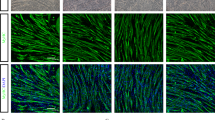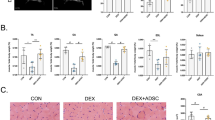Abstract
Muscle atrophy significantly impairs health and quality of life; however, there is still no cure. Recently, the possibility of regeneration in muscle atrophic cells was suggested through mitochondrial transfer. Therefore, we attempted to prove the efficacy of mitochondrial transplantation in animal models. To this end, we prepared intact mitochondria from umbilical cord-derived mesenchymal stem cells maintaining their membrane potential. To examine the efficacy of mitochondrial transplantation on muscle regeneration, we measured muscle mass, cross-sectional area of muscle fiber, and changes in muscle-specific protein. In addition, changes in the signaling mechanisms related to muscle atrophy were evaluated. As a result, in mitochondrial transplantation, the muscle mass increased by 1.5-fold and the lactate concentration decreased by 2.5-fold at 1 week in dexamethasone-induced atrophic muscles. In addition, a 2.3-fold increase in the expression of desmin protein, a muscle regeneration marker, showed a significant recovery in MT 5 µg group. Importantly, the muscle-specific ubiquitin E3-ligases MAFbx and MuRF-1 were significantly decreased through AMPK-mediated Akt-FoxO signaling pathway by mitochondrial transplantation compared with the saline group, reaching a level similar to that in the control. Based on these results, mitochondrial transplantation may have therapeutic applications in the treatment of atrophic muscle disorders.







Similar content being viewed by others
References
Alesci S, Manoli I, Michopoulos VJ, Brouwers FM, Le H, Gold PW, Blackman MR, Rennert OM, Su YA, Chrousos GP (2006) Development of a human mitochondria-focused cDNA microarray (hMitChip) and validation in skeletal muscle cells: implications for pharmaco- and mitogenomics. Pharmacogenomics J 6:333–342. https://doi.org/10.1038/sj.tpj.6500377
Asakura A (2012) Skeletal muscle-derived hematopoietic stem cells: muscular dystrophy therapy by bone marrow transplantation. J Stem Cell Res Ther Suppl 11. https://doi.org/10.4172/2157-7633.S11-005
Berardi E, Annibali D, Cassano M, Crippa S, Sampaolesi M (2014) Molecular and cell-based therapies for muscle degenerations: a road under construction. Front Physiol 5:119. https://doi.org/10.3389/fphys.2014.00119
Bogdanis GC (2012) Effects of physical activity and inactivity on muscle fatigue. Front Physiol 3:142. https://doi.org/10.3389/fphys.2012.00142
Bonaldo P, Sandri M (2013) Cellular and molecular mechanisms of muscle atrophy. Dis Mmodels Mech 6:25–39. https://doi.org/10.1242/dmm.010389
Calvani R, Joseph AM, Adhihetty PJ, Miccheli A, Bossola M, Leeuwenburgh C, Bernabei R, Marzetti E (2013) Mitochondrial pathways in sarcopenia of aging and disuse muscle atrophy. Biol Chem 394:393–414. https://doi.org/10.1515/hsz-2012-0247
Caplan AI (2007) Adult mesenchymal stem cells for tissue engineering versus regenerative medicine. J Cell Physiol 213:341–347. https://doi.org/10.1002/jcp.21200
Cerletti M, Jurga S, Witczak CA, Hirshman MF, Shadrach JL, Goodyear LJ, Wagers AJ (2008) Highly efficient, functional engraftment of skeletal muscle stem cells in dystrophic muscles. Cell 134:37–47. https://doi.org/10.1016/j.cell.2008.05.049
Chang CY, Liang MZ, Chen L (2019) Current progress of mitochondrial transplantation that promotes neuronal regeneration. Transl Neurodegener 8:17. https://doi.org/10.1186/s40035-019-0158-8
Cipolat S, Martins de Brito O, Dal Zilio B, Scorrano L (2004) OPA1 requires mitofusin 1 to promote mitochondrial fusion. Proc Natl Acad Sci USA 101:15927–15932. https://doi.org/10.1073/pnas.0407043101
Duclos M, Gouarne C, Martin C, Rocher C, Mormede P, Letellier T (2004) Effects of corticosterone on muscle mitochondria identifying different sensitivity to glucocorticoids in Lewis and Fischer rats. Am J Physiol Endocrinol Metab 286:E159–E167. https://doi.org/10.1152/ajpendo.00281.2003
Emani SM, McCully JD (2018) Mitochondrial transplantation: applications for pediatric patients with congenital heart disease. Transl Pediatr 7:169–175. https://doi.org/10.21037/tp.2018.02.02
Fanzani A, Conraads VM, Penna F, Martinet W (2012) Molecular and cellular mechanisms of skeletal muscle atrophy: an update. J Cachexia Sarcopenia Muscle 3:163–179. https://doi.org/10.1007/s13539-012-0074-6
Fitts RH, Riley DR, Widrick JJ (2000) Physiology of a microgravity environment invited review: microgravity and skeletal muscle. J Appl Physiol (1985) 89:823–839. https://doi.org/10.1152/jappl.2000.89.2.823
Gorza L, Sorge M, Secli L, Brancaccio M (2021) Master regulators of muscle atrophy: role of costamere components. Cells 10:61. https://doi.org/10.3390/cells10010061
Jagoe RT, Goldberg AL (2001) What do we really know about the ubiquitin-proteasome pathway in muscle atrophy? Curr Opin Clin Nutr Metab Care 4:183–190. https://doi.org/10.1097/00075197-200105000-00003
Kalyani RR, Corriere M, Ferrucci L (2014) Age-related and disease-related muscle loss: the effect of diabetes, obesity, and other diseases. Lancet Diabetes Endocrinol 2:819–829. https://doi.org/10.1016/S2213-8587(14)70034-8
Kandarian SC, Jackman RW (2006) Intracellular signaling during skeletal muscle atrophy. Muscle Nerve 33:155–165. https://doi.org/10.1002/mus.20442
Kim MJ, Kim ZH, Kim SM, Choi YS (2016) Conditioned medium derived from umbilical cord mesenchymal stem cells regenerates atrophied muscles. Tissue Cell 48:533–543. https://doi.org/10.1016/j.tice.2016.06.010
Kim MJ, Hwang JW, Yun CK, Lee Y, Choi YS (2018) Delivery of exogenous mitochondria via centrifugation enhances cellular metabolic function. Sci Rep 8:3330. https://doi.org/10.1038/s41598-018-21539-y
Krawiec BJ, Frost RA, Vary TC, Jefferson LS, Lang CH (2005) Hindlimb casting decreases muscle mass in part by proteasome-dependent proteolysis but independent of protein synthesis. Am J Physiol Endocrinol Metab 289:E969–E980. https://doi.org/10.1152/ajpendo.00126.2005
Lecker SH, Goldberg AL, Mitch WE (2006) Protein degradation by the ubiquitin-proteasome pathway in normal and disease states. J Am Soc Nephrol 17:1807–1819. https://doi.org/10.1681/ASN.2006010083
Lee CM, Lopez ME, Weindruch R, Aiken JM (1998) Association of age-related mitochondrial abnormalities with skeletal muscle fiber atrophy. Free Radic Biol Med 25:964–972. https://doi.org/10.1016/s0891-5849(98)00185-3
Lightowlers RN, Chrzanowska-Lightowlers ZM, Russell OM (2020) Mitochondrial transplantation—a possible therapeutic for mitochondrial dysfunction?: mitochondrial transfer is a potential cure for many diseases but proof of efficacy and safety is still lacking. EMBO Rep 21:e50964. https://doi.org/10.15252/embr.202050964
Liu CS, Chang JC, Kuo SJ, Liu KH, Lin TT, Cheng WL, Chuang SF (2014) Delivering healthy mitochondria for the therapy of mitochondrial diseases and beyond. Int J Biochem Cell Biol 53:141–146. https://doi.org/10.1016/j.biocel.2014.05.009
Manoli I, Le H, Alesci S, McFann KK, Su YA, Kino T, Chrousos GP, Blackman MR (2005) Monoamine oxidase-A is a major target gene for glucocorticoids in human skeletal muscle cells. FASEB J 19:1359–1361. https://doi.org/10.1096/fj.04-3660fje
Marone JR, Falduto MT, Essig DA, Hickson RC (1994) Effects of glucocorticoids and endurance training on cytochrome oxidase expression in skeletal muscle. J Appl Physiol (1985) 77:1685–1690. https://doi.org/10.1152/jappl.1994.77.4.1685
Martens ME, Peterson PL, Lee CP (1991) In vitro effects of glucocorticoid on mitochondrial energy metabolism. Biochim Biophys Acta 1058:152–160. https://doi.org/10.1016/s0005-2728(05)80232-4
Matthews E, Brassington R, Kuntzer T, Jichi F, Manzur AY (2016) Corticosteroids for the treatment of Duchenne muscular dystrophy. Cochrane Database Syst Rev CD003725. https://doi.org/10.1002/14651858.CD003725.pub4
McCully JD, Cowan DB, Pacak CA, Toumpoulis IK, Dayalan H, Levitsky S (2009) Injection of isolated mitochondria during early reperfusion for cardioprotection. Am J Physiol Heart Circ Physiol 296:H94–H105. https://doi.org/10.1152/ajpheart.00567.2008
Menconi M, Gonnella P, Petkova V, Lecker S, Hasselgren PO (2008) Dexamethasone and corticosterone induce similar, but not identical, muscle wasting responses in cultured L6 and C2C12 myotubes. J Cell Biochem 105:353–364. https://doi.org/10.1002/jcb.21833
Mitsui T, Azuma H, Nagasawa M, Iuchi T, Akaike M, Odomi M, Matsumoto T (2002a) Chronic corticosteroid administration causes mitochondrial dysfunction in skeletal muscle. J Neurol 249:1004–1009. https://doi.org/10.1007/s00415-002-0774-5
Mitsui T, Umaki Y, Nagasawa M, Akaike M, Aki K, Azuma H, Ozaki S, Odomi M, Matsumoto T (2002b) Mitochondrial damage in patients with long-term corticosteroid therapy: development of oculoskeletal symptoms similar to mitochondrial disease. Acta Neuropathol 104:260–266. https://doi.org/10.1007/s00401-002-0553-5
Orfany A, Arriola CG, Doulamis IP, Guariento A, Ramirez-Barbieri G, Moskowitzova K, Shin B, Blitzer D, Rogers C, Del Nido PJ, McCully JD (2020) Mitochondrial transplantation ameliorates acute limb ischemia. J Vasc Surg 71:1014–1026. https://doi.org/10.1016/j.jvs.2019.03.079
Pendergrass W, Wolf N, Poot M (2004) Efficacy of MitoTracker Green and CMXrosamine to measure changes in mitochondrial membrane potentials in living cells and tissues. Cytometry 61A:162–169. https://doi.org/10.1002/cyto.a.20033
Powers SK, Wiggs MP, Duarte JA, Zergeroglu AM, Demirel HA (2012) Mitochondrial signaling contributes to disuse muscle atrophy. Am J Physiol Endocrinol Metab 303:E31–E39. https://doi.org/10.1152/ajpendo.00609.2011
Qin W, Pan J, Wu Y, Bauman WA, Cardozo C (2010) Protection against dexamethasone-induced muscle atrophy is related to modulation by testosterone of FOXO1 and PGC-1alpha. Biochem Biophys Res Commun 403:473–478. https://doi.org/10.1016/j.bbrc.2010.11.061
Rahimov F, Kunkel LM (2013) Cellular and molecular mechanisms underlying muscular dystrophy. J Cell Biol 201:499–510. https://doi.org/10.1083/jcb.201212142
Romanello V, Guadagnin E, Gomes L, Roder I, Sandri C, Petersen Y, Milan G, Masiero E, Del Piccolo P, Foretz M, Scorrano L, Rudolf R, Sandri M (2010) Mitochondrial fission and remodelling contributes to muscle atrophy. EMBO J 29:1774–1785. https://doi.org/10.1038/emboj.2010.60
Romanello V, Sandri M (2015) Mitochondrial quality control and muscle mass maintenance. Front Physiol 6:422. https://doi.org/10.3389/fphys.2015.00422
Schiaffino S, Dyar KA, Ciciliot S, Blaauw B, Sandri M (2013) Mechanisms regulating skeletal muscle growth and atrophy. FEBS J 280:4294–4314. https://doi.org/10.1111/febs.12253
Shi M, Ishikawa M, Kamei N, Nakasa T, Adachi N, Deie M, Asahara T, Ochi M (2009) Acceleration of skeletal muscle regeneration in a rat skeletal muscle injury model by local injection of human peripheral blood-derived CD133-positive cells. Stem Cells 27:949–960. https://doi.org/10.1002/stem.4
Wang X, Pickrell AM, Rossi SG, Pinto M, Dillon LM, Hida A, Rotundo RL, Moraes CT (2013) Transient systemic mtDNA damage leads to muscle wasting by reducing the satellite cell pool. Hum Mol Genet 22:3976–3986. https://doi.org/10.1093/hmg/ddt251
Wu S, Zhou F, Zhang Z, Xing D (2011) Mitochondrial oxidative stress causes mitochondrial fragmentation via differential modulation of mitochondrial fission-fusion proteins. FEBS J 278:941–954. https://doi.org/10.1111/j.1742-4658.2011.08010.x
Yamada Y, Ito M, Arai M, Hibino M, Tsujioka T, Harashima H (2020) Challenges in promoting mitochondrial transplantation therapy. Int J Mol Sci 21:6365. https://doi.org/10.3390/ijms21176365
Yamamoto D, Maki T, Herningtyas EH, Ikeshita N, Shibahara H, Sugiyama Y, Nakanishi S, Iida K, Iguchi G, Takahashi Y, Kaji H, Chihara K, Okimura Y (2010) Branched-chain amino acids protect against dexamethasone-induced soleus muscle atrophy in rats. Muscle Nerve 41:819–827. https://doi.org/10.1002/mus.21621
Funding
This research was supported by the Bio and Medical Technology Development Program of the National Research Foundation of Korea (NRF), funded by the Ministry of Science and ICT (grant no. NRF-2018M3A9B5023052) and by a grant of the Korea Health Technology R&D Project through the Korea Health Industry Development Institute (KHIDI), funded by the Ministry of Health & Welfare, Republic of Korea (grant no. HI22C0623).
Author information
Authors and Affiliations
Corresponding author
Ethics declarations
Conflict of interest
The authors declare no conflicts of interest.
Additional information
Publisher’s Note
Springer Nature remains neutral with regard to jurisdictional claims in published maps and institutional affiliations.
Electronic supplementary material
Below is the link to the electronic supplementary material.
Rights and permissions
Springer Nature or its licensor (e.g. a society or other partner) holds exclusive rights to this article under a publishing agreement with the author(s) or other rightsholder(s); author self-archiving of the accepted manuscript version of this article is solely governed by the terms of such publishing agreement and applicable law.
About this article
Cite this article
Kim, M.J., Lee, J.M., Min, K. et al. Xenogeneic transplantation of mitochondria induces muscle regeneration in an in vivo rat model of dexamethasone-induced atrophy. J Muscle Res Cell Motil (2023). https://doi.org/10.1007/s10974-023-09643-7
Received:
Accepted:
Published:
DOI: https://doi.org/10.1007/s10974-023-09643-7




